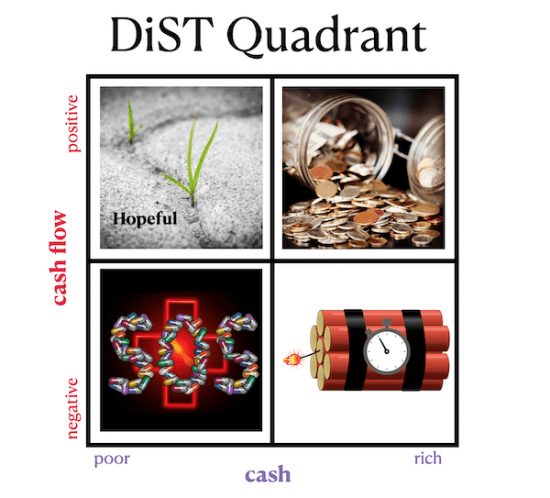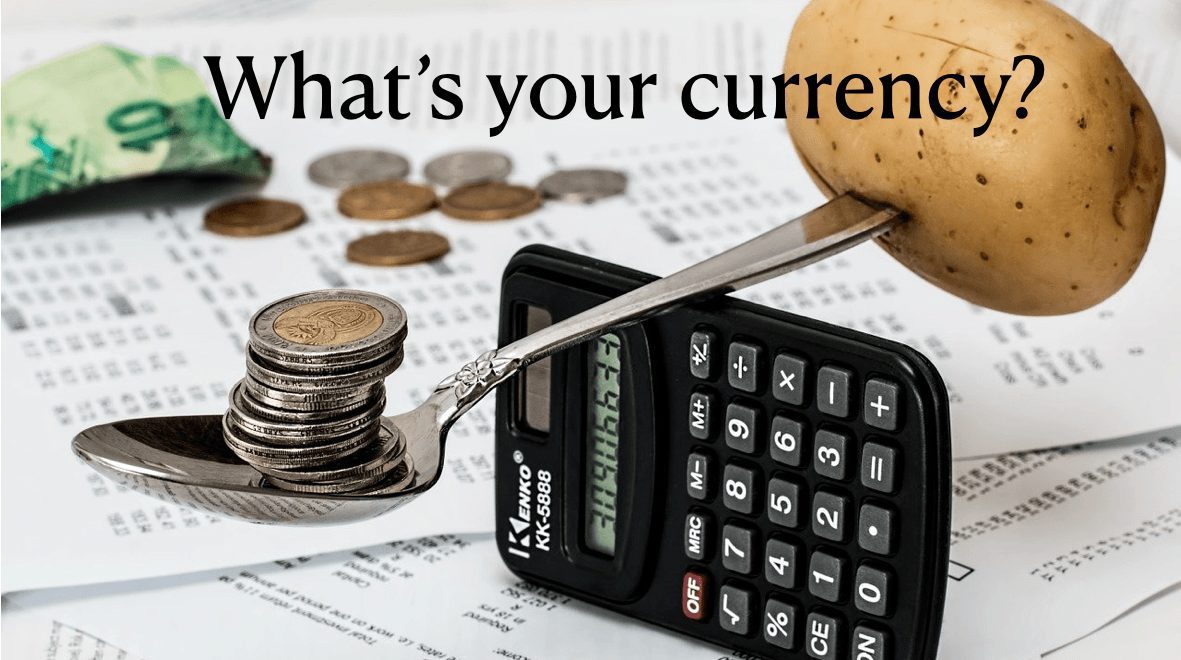Just because you can… should you?
In countries around the world grappling with the pandemic, executives are being faced with a large number of difficult decisions. We’ve already seen many companies announce layoffs or, worse, having to shut their doors. For the ongoing concerns, will they die, survive or thrive? Companies will fit into one of the DiST quadrants.

The DiST quadrant
Why DiST? I call it the DiST Quadrant because it stands for Die, Survive or Thrive. And it has just two axes: cash flow and cash. No wonder the expression, cash is king.
During this type of prolonged crisis, the more perilous situations naturally get accentuated. Companies that learned to be agile and were more effective in implementing a digital transformation in advance of the pandemic gave themselves a running head start. These are certainly not times to be dilly-dallying. As my friend Oli reminded me of the Vladimir Lenin quote, “There are decades where nothing happens; and there are weeks where decades happens.” In this pandemic, business has changed as much in the last six months as might have taken a decade to do otherwise.
Some companies (bottom left of the Quadrant) are at knife’s edge and having to scramble for every penny in a fight for survival. There are other companies that are flush with cash, but whose business is declining (bottom right) and risk going under if they don’t turn the trend around. Some companies find themselves growing, but lack the funds to support their growth (top left). And, finally, there are those companies that are cash rich and growing wildly (top right). It’s likely that they are in the right sector at the right time. For each case, there’s a very different set of solutions. Which best describes your company?
The ethical quandary
It’s clear that staying afloat is primordial. To the extent you are poor in cash, your horizon shrinks and shorter-term measures are necessary. Among the strategies being deployed, there are some choices that are easier than others and some that are more or less ethical. Having knowledge of the full range of options (and their consequences) is a challenge with so many moving parts. The ethical component is particularly challenging and relevant in an era where society at large — suffering from sanitary, economic and political crises — is in peril. Every type of company needs to be looking carefully at its actions if there is to be a tomorrow. In a world that where business is becoming increasingly transparent, the ‘how’ does count, not just the why.
The how counts

Even for the companies that are growing fast and cash rich in this period, assuming their performance has been aided by the crisis situation (i.e. online players), their management should use this time to take a hard look at the long-term picture. It’s in the upcycle that you make the most important decisions in anticipation of the next downward dip. When times are difficult, though, relationships and preconceived notions get put to the test. It’s an exercise in futility to try to budget accurately for 2021 when much is left in the hands of a virus, government policies and public opinion. But, these are times when every executive needs to lean in on his/her intention. Leaders need to bank on the most important currency of all: trust.
Intentionality + Action builds Trust
I have had conversations with many business owners and executives and am often saddened by what I hear. First, it’s clear that many feel the worst is yet to come. Secondly, there’s a good amount of frustration with the way governments have only listened to medical experts for guidance. I join them in believing that governments ought to give weight to a wider pool of inputs, including sociologists, anthropologists, economists, data scientists and business people. Business is not only important for the economy, it’s also a meaningful sense of duty and/or utility for many employees. Especially in the service industry, it’s a part of the local community fabric. Thirdly, some more shark-minded CEOs are taking full advantage of this period to do things that they would not ordinarily have done or been allowed to do. For example, I heard an entrepreneur who owns a successful chain of restaurants say that it was more profitable to take the furlough option offered by the government versus being open under the imposed conditions. Essentially, from a business perspective, he didn’t see a reasonable alternative. Yet, there are wider issues to consider: the mental health of the employees stuck at home, the lack of an operational presence in each community, not to mention the fact that the government’s money might have been better used by some needier businesses. If the restaurant employees knew his pure profit motif, would they be supportive? How would consumers react if they knew as much?
The lasting changes
Notwithstanding the large number of companies that will have to shrink or disappear during/after the pandemic, there are plenty of “nice to have” ideas (i.e. lines on a P&L) that will be relegated to “no longer necessary.” I think of how McDonalds rolled back its decision to have breakfast on offer all day long. It was presented as a temporary efficiency measure. Was that decision, which was initially to placate its customers (i.e. in line with being customer centric), taken because of cost savings or because of the internal strife it had caused among employees and franchisees when it was instituted? In general, I can imagine that a lot of freebies and amenities will be pulled back as far as possible. Think: hotel goodies, rich loyalty cards and free snacks and beverages at the office. When customers and employees knew those perks were “too good to be true,” you won’t hear a peep. But, if these benefits were higher up as part of the perceived satisfaction (e.g. compensating for a lesser service, product or ambiance), these decisions may penalize that company longer term versus a competitor that knew better.
Of course, it’s better to survive than die, but how you do it matters. If you intend to thrive, you will need to tend not just to the bottom line, but to the overall eco-system around you. If a company takes every available action (e.g. every possible subsidy, cutting as many corners and costs as possible…) and survives through less ethical actions and with less honorable intentions, I am convinced that the company’s longer-term brand will be impacted. It’s not because you can do it that you should always do so. Stop to think through the ramifications if your wider community came to know your real intentions and motivations.
Does this provoke any thoughts or reactions?
***If you like my writing and are interested in fostering more meaningful conversations in our society, please check out my Dialogos Substack. This newsletter will feature articles on why and how we can all improve our conversations, whether it’s at home, with friends, in society at large or at work. Subscription is free, but if you see value in it, you are welcome to contribute both materially and through your comments. Sign up here:











